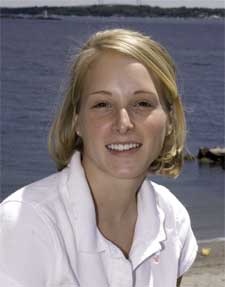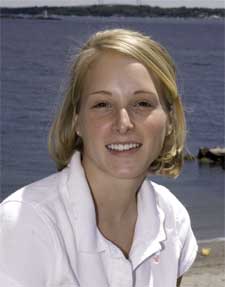 Delran, N.J. native ships out to Pearl Harbor in September
Delran, N.J. native ships out to Pearl Harbor in September
NARRAGANSETT, R.I. – June 19, 2008 – Michelle Aleszczyk was a three-sport athlete in high school and an honors student at the U.S. Naval Academy. In August she will become the first commissioned naval officer to earn a master’s degree in oceanography from the University of Rhode Island through a new partnership with the Academy.
“This partnership is a win-win situation for everyone involved,” said David Smith, associate dean of the URI Graduate School of Oceanography. “We can offer students specialty areas that aren’t available at other graduate schools, and the students retain their commission in the Navy and draw their regular Navy salary. Our professors get top-quality, highly-motivated students to work with, and the Navy gets officers with experience conducting research in a discipline that meets its needs in operational oceanography.”
URI has a similar agreement with the U.S. Coast Guard.
Aleszczyk, 23, who grew up in Delran, N.J., enrolled in the Naval Academy after attending a one-week introductory program there as a junior in high school.
“I fell in love with the place,” she said. “I loved the discipline, and I was especially impressed with the character of the people I met there. That’s not usually something most students think about when deciding on a college – it’s hard to quantify – but I was blown away by how compassionate and caring the students are.”
During her senior year, she developed an interest in eventually working in the Navy’s meteorology and oceanography forecasting program, which would require that she earn a master’s degree, and her advisor urged her to apply to URI.
“When I visited the Bay Campus, I got a similar feeling as when I first visited the Naval Academy,” Aleszczyk said. “It’s a small, comfortable program, and I got a great feeling about the students and faculty.”
For the last two years, she worked in collaboration with URI marine scientist David Ullman studying the dynamics of the ocean circulation at the midshelf front off the coast of New Jersey. Coastal ocean fronts are important in the carbon cycle, particularly because they can act as a barrier between river run-off and ocean waters.
“It’s an area of the continental shelf where the water has strong temperature contrasts, it’s highly rich in nutrients, and it should have strong water velocities at the surface, though we didn’t see much of that,” she explained.
Aleszczyk spent long hours analyzing satellite data from NASA websites looking for what she called the “surface signature” of the front. She also used surface velocities from Rutgers University’s high-frequency radar to better understand the structure of shelf flow in that region.
“I learned a lot about scientific methods and how hard research is,” she said. “Everything takes three times as long as you expect it will take.”
After completing her thesis in August, Aleszczyk will have a brief break before shipping out to Pearl Harbor, where she will be based for the next 27 months or more, though much of that time she will be at sea as the auxiliary officer aboard a destroyer.
“After being away from the Navy for two years, I feel like I really appreciate it more,” she said. “I’m really looking forward to getting back to it.”
When she completes her Pearl Harbor assignment, Aleszczyk will apply to join the meteorology and oceanographic forecasting program at Stennis, Miss., which has operations in numerous locations around the globe.
And after that?
“I’m committed to the Navy until I’m 30, and I’ll see where I’m at and what I’m doing then before deciding what’s next. I know I want to have a family. I might want to become an oceanography professor,” she said. “But I’ve got a lot on my plate between now and then.”
URI Department of Communications and Marketing Photo by Michael Salerno Photography

